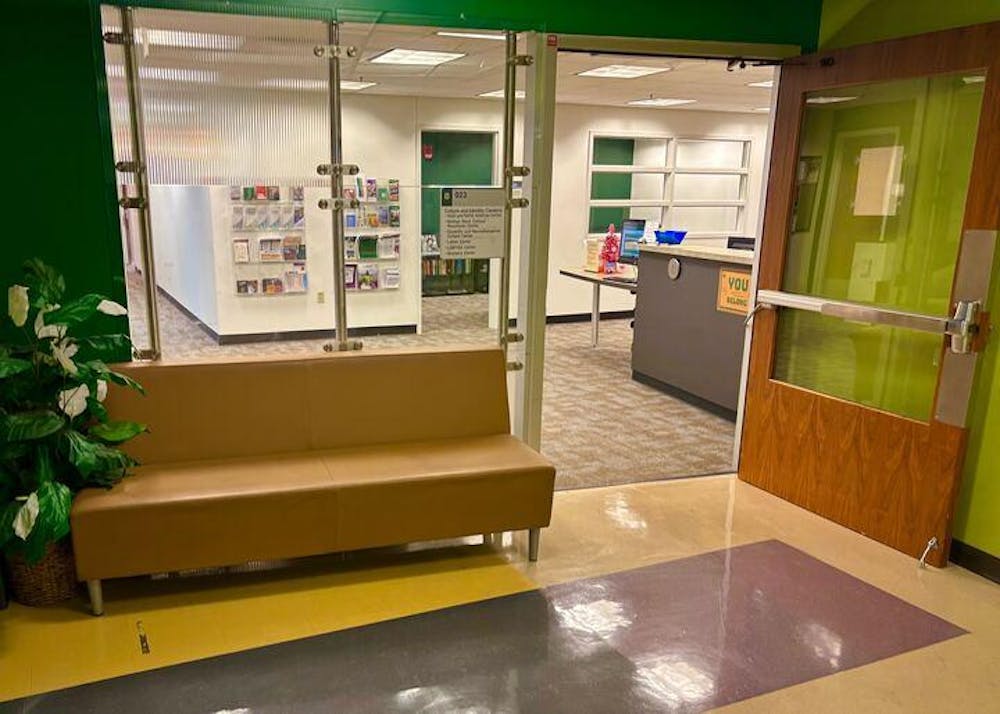Since his inauguration, President Donald Trump has been signing orders banning diversity, equity and inclusion efforts across the nation. Because of these new rules and regulations, many universities shut down their programs and identity centers immediately. With Wright State University's student-centric ideologies and claims, it is only natural that they did not take this approach. However, with the current state of the country, students are left uncertain about what the future of WSU's beloved Cultural and Identity Centers might be.
Why students love the CIC
WSU's CIC offers six different spaces that are safe for anybody who identifies or aligns with any of the groups included in these centers.
Oscar Garcia is the President of the Indigenous American Cultural Student Association. With this position, he is heavily involved in IACSA and the Asian and Native American Center at the CIC.
"I had this place starting off with college. So, it's like, as a first [generation] college student, I feel like this place is where some of our first gen college students, specifically people of color, can come to," Garcia said.
Garcia shared that the CIC has been a useful resource throughout his time in college for many reasons. He described the relationships that he has been able to build as a result.
In regard to the CIC, Garcia said "...this is a place of community. And if this place disappears, then where does that community go? That's kind of the problem; not that we can't congregate ourselves, but this is a place to like that we know that we can hang out, that we have a place [where we] can just come in and be ourselves unapologetically."
Garcia is far from alone in his feelings, as many other students within the ANA also share his feelings of belonging for their own reasons.
Katie Thai is a political science major who is set to graduate WSU in Fall 2026. She is involved in many organizations on campus, including the Asian Student Association.
"The CIC has undoubtedly bettered my college experience whether that was through the community or the staff support. Spaces I frequent, like the ANA center, are welcomed to everyone and ASA events often center around cultural education and friendship building. College is a weird time in life because everyone is looking to understand who they are and fit in the world; the center creates spaces for belonging. Not to mention the staff support, Dr. Nicolyn Woodcock, the staff advisor of the ANA center has given me more than enough support throughout my years at [WSU]. She's always there when we needed her. From emotional support to helping me print papers, she does it all," Thai said.
The staff at the CIC are beloved by all students for the many events and resources they provide. Each and every one of them have had a lasting impact on their community that is clear to see from interacting with any students who have set foot in the CIC.
Chloee King is a freshman at WSU who is majoring in math education. They spend a lot of their time in the LGBTQA Center and also shared a particularly close connection with one of the CIC staff members, Dr. Emily Yantis-Houser, the Director of the LGBTQA Center.
"I love Dr. Emily. She's I think one of the best professors. And the way that she is the best, because she's so openly, like queer. She's like, I have a wife, we have a kid, we're queer, deal with it. I love seeing that because that gives me hope that I can do that. If she goes away, I go away. She goes; I go," King said.
With so many rich communities wrapped into one space, it is no wonder that the CIC has become a staple of WSU life within the few years that it has been open. But with blurry bans being placed on DEI, questions arise for many students.
"The CIC has given myself and many of my peers a community to be a part of on campus and staff advisors that I know would advocate on our behalf. Although many recent legislative changes have come along, I know that [WSU] prioritizes their students and wants to keep our community strong," Thai said.
The laws and executive orders

Em Ranalli and Oscar Garcia, members of the ANA center, are pictured.
Daniel Wasniewski is a first-year graduate student in public administration. He is also the President of the Progressive Students Coalition and always reads up on the bills and orders that are being passed and proposed.
"In essence, what it is [is] an academic censorship bill. It [is], among many other things, a multifaceted ban on basically any form of DEI activity," Wasniewski said.
"As someone who wants to become a teacher one day, and also identifies as queer, if I become a teacher, how is that gonna affect me? Are students allowed like to discriminate towards me because I identify as queer? Are administrators aloud? That's really scary," King said.
Dylan O'Brien is a freshman majoring in computer science. They keep up to date on politics, especially things regarding their beloved queer community.
"I know, with everything going on right now, the university is more hesitant to give us funding. It means that we've been taken from closing at 8 p.m. every night to closing at 5 p.m., which does make a huge difference for the multitude of people who are always in here until 8 p.m. because this is a safe space. And the university does not want to provide funding or support having the center open longer, so they have decided to shut us down at 5 p.m. every day instead to simplify things and to save money like one of the huge problems with this bill is there are no limits as far as what DEI activities could be. So, it is everything which is, like some people don't realize. DEI is ADA. It is inclusive spaces," O'Brien said.
Cutting the CIC's hours has already been negatively impactful for many students who rely on those safe spaces to hang out with friends or get their work done. Many of these students now feel displaced during those hours and retreat home, lessening their involvement and interaction with peers.
"If DEI gets eliminated completely, this is gone. There's no more community groups, there's no more sex education events. There [are] no more centers. There's no more, it's just erased," O'Brien said.
O'Brien elaborated on a lot of the life-changing resources offered by CIC. These include educational pamphlets, events on important topics, free resources the CIC hands out to students, and more. These have made a positive impact in the WSU community and impacted all populations of students that have used them, according to O'Brien and King.
"I do think that it is crucial that everyone knows, especially with the laws that are being instituted right now or are being delivered upon the policy legislation, everyone knows the full scope and extent of their rights under the present statutory framework, and also under [the] proposed statutory framework, if these laws are to be instituted, so that people know whether their rights are being violated or not," Wasniewski said.
Bathrooms
Senate Bill 104 is a separate bill from Senate Bill 1, as shared by Wasniewski, and SB 104 has already gone into effect in Ohio. This is attempting to ban transgender students from using certain bathrooms, as well as banning all gender-neutral bathrooms.

Educational pamphlets offered in CIC

The sign on the entryway to the CIC, listing all the centers

You Belong sign on CIC front desk
"Something else that this bill has created is not just there are no more all-gender bathrooms. Trans students who use the bathroom can no longer be protected from hate crimes if a trans male, so assigned female at birth, now identifying as male, walks into the female bathroom because that was their bathroom assigned at birth, and they get hate-crimed because they no longer identify as female, they can't be protected. There's nothing that can be done. The law is on the side of the person who hate crimes them if they walk into the male bathroom," O'Brien said.
Ray Purnell is a student worker in the CIC. He can often be found at the general front desk, but he is specifically employed by the LGBTQA Center. He shared that he and another student worker have federal aid, which covers their work studies and allows the two of them to keep the CIC open until 8 p.m. on Tuesdays and Thursdays, despite WSU cutting the funds to remain open. Purnell also shared WSU's plans for SB 104, and the future of the campus bathrooms.
"So, I know with our newest bathroom bill that has just gone into act, we will be losing our all-gender bathrooms on campus. All of those will go back. Well, we don't know exactly when it's happening yet, but our idea is they are mostly going to go back to male and female bathrooms. If they have urinals, it will be male. If it has toilets, it will be marked as female. If there's any single stalls, they will be universal or family bathrooms. So those will still be safe for transgender students to go in if they don't feel comfortable going to one or the other," Purnell said.
However, these bathrooms are less frequent and therefore far more difficult to find, which is likely to create a barrier for trans students.
"[WSU] is not going to stop helping students until it has no other choice," Purnell said. He shared that this would extend to bathrooms, legal name changes through Student Legal Services as well as CIC and other affinity groups.
The Ohio law banning gender-neutral bathrooms went into effect on Feb. 25. Unfortunately, it did not take long until students began noticing the gender-neutral bathrooms switching to male and female. As of Thursday, Feb. 27, it seems that the majority of bathrooms have changed over already.
What comes next?
Unfortunately, the answer to this question is still unknown. While students are left feeling fear and uncertainty, WSU has yet to come forward with any information to put them at ease.
"It poses an egregious threat to everyone's like physical safety and mental health and well-being, among other things," Wasniewski said, regarding the legislation and all of the unknowns that WSU students and all Americans feel right now.
"If I had a choice, I'd be in Canada right now," King said. "I don't care about the cold. I want my freedom."
Despite some feelings of hopelessness, the CIC still remains active, meaning that this fight is far from finished.
"Our hours have been cut, but we are open. Yeah, we are now open until 5 p.m. most days, besides Tuesday and Thursday. If the centers have events or anything, those can still be held here after hours, the centers are going to continue to be open. We are not closing down. We're not stopping," Purnell said.
It is important that students hold onto hope and, more importantly, use their voices to speak out about what matters to them. Unfortunately, it is clear that no one at this level of WSU is certain of what is happening right now, or what the future is going to look like. Minimal information has been given to all students, as well as staff and faculty members. Hopefully, that will soon change.










